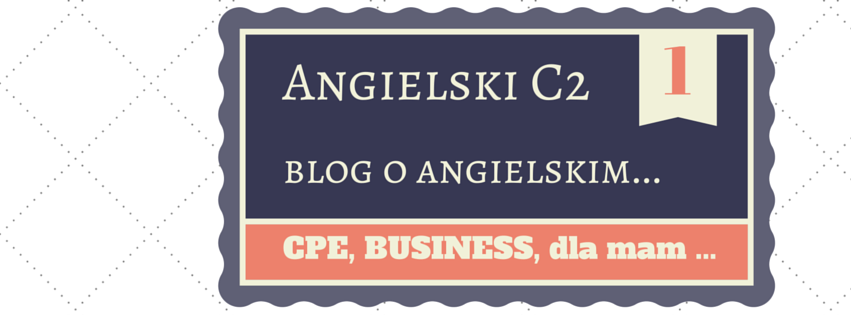headlinese – język nagłówków prasowych
Wiecie, że istnieje specyficzna odmiana angielskiego z własnymi zasadami gramatycznymi i charakterystycznym słownictwem używana w nagłówkach prasowych? Istnieje, ta odmiana to tzw headlinese. Kiedyś to był mój konik. Pisałam o tym pracę licencjacką a części o hedlinese użyłam też jako wstępu do pracy magisterskiej (pisałam o kryzysie finansowym i jak jest on opisywany w nagłówkach z The Daily Telegraph, stworzyłam korpus 2000 nagłówków z 10 miesięcznej publikacji gazety z działu finance i pisałam o charakterystycznym słownictwie, kolokacjach i metaforach związanych z financial crisis).
To było już tak dawno, a że znalazłam właśnie na kompie swoją pracę to postanowiłam się podzielić częścią o zasadach języka headlinese, może kogoś zainspiruje. Znając zasady, dopisując własne przykłady i tworząc korpus na jakiś przewijający się jakiś czas temat (elections, stock exchange, William and Cate, Pope…) można by się pokusić o napisanie własnej pracy. Moje 'wypociny’ mogą służyć za inspirację a nie za gotowiec, proszę nie kopiować.
Dla pasjonatów nie anglistów polecam fragment o ambiguity (dwuznaczność) i puns (żart słowny)
Mój rozdział wstępniak o headlinese miał 25 stron, poniżej kopiuję wybrane fragmenty:
- „Use of short words in headlines:
(…)
• mull (verb: to ponder) e.g. UK military deployed to Libya as EU mulls sending 1,000 humanitarian troops
• assail (verb: to attack, usually verbally) e.g. Debt fears assail markets from all sides
• ban (verb: to prohibit; noun: a proscription) e.g. Gary Glitter free to travel abroad after ban lifted
• cut (verb: to reduce; noun, often ‘cuts’: a reduction) e.g. Nokia Siemens to cut 17,000 jobs, 23% of its workforce
• axe (verb: to reduce drastically, or to abolish) e.g. Cheshire councils to axe 70 IT jobs
• hit (verb: to affect adversely) e.g. Strikes to hit Italian press
• talks (noun: negotiations, or a discussion, or a meeting) e.g. Cameron holding talks with Merkel
• nab (verb: to capture or arrest) e.g. FBI: Nicknames Help Nab Bank Robbers
• probe (noun: investigation) e.g. Football: Mourinho in probe
• woe (noun: misfortune) e.g. More woe for England as Delon Armitage is banned from facing France
• nix (verb: to ban, prohibit, exlude) e.g. Dereck Chisora nixed as Wladimir Klitschko sets sights on David Haye (…)
- use of noun phrases
‘(…)
George Clooney and Cristiano Ronaldo star in Berlusconi trial witness list
The Guardian (23 November 2011)
Public sector strike could cost £500m, say ministers
The Guardian (24 November 2011)
North Sea crash helicopter’s gearbox 'failed’
The Independent (24 November 2011)
Those headlines clearly demonstrate the usage of noun phrases with the head noun being respectively: list, strike and gearbox. The heads are pre-modified by nouns like: trial witness, public sector and North Sea crash helicopter. The last headline is particularly interesting as there is a high concentration of pre-modifiers, which serve the purpose of packaging a great deal of information into a short headline, which otherwise would have to be described in a whole sentence e.g.: The helicopter, that crashed over the North Sea, had a broken gearbox. (…)
• Omission of determiners, articles, auxiliaries and copula verbs:
(…)
Police kill man brandishing gun after row with girlfriend
The Guardian (30 October 2008)
(…)
• Use of passive voice:
(…)
Iraq hit by series of fatal bombings
The Guardian (26 November 2011)
British soldier killed in Afghanistan
The Guardian (20 November 2011)
Both extracts omit the verb to be, which is an integral part of the passive voice structure. Also the common feature of headlines’ grammar is to dispose of by + agent, by which the journalists can leave readers in suspense, or avoid libellous statements or naming suspects. (…)
• Ambiguity
(…)
Generals fly back to front, ambiguity lies in the wrong selection of the word front which has a double meaning here. The author of the press article meant that the generals were returning to the front line, however, because of the clumsy matching of the words, readers can understand the message as: the generals have the ability to fly in the position of back to front.
1. Grammatical ambiguity:
a) Poorly chosen nouns and verbs:
Local man finds Picasso drawing in shed
S. Thorne [Thorne 2008: 267]
Here the problem lies in the word drawing as in grammatically it can be a verbal noun pre-modified by Picasso (meaning Picasso’s picture – the purpose of the headline’s author) or a present participle. The latter incorrectly indicate that the man found real man, the Picasso sitting in a shed and drawing a picture
Man eating piranha mistakenly sold as petfish
Internet
Again, the ambiguous part is eating as it can be connected with man coining a phrase man eating i.e. the pre-modifier of piranha or eating can just be a present participle. Readers are left to decide whether eating refers to the feature of a piranha which is a man eater or whether there was a man who was eating that piranha. (…)
b) Misplaced modifiers
(…)
One instance of misplaced modifier was shown above, but the one below is more striking:
2 sisters reunited after 18 years in checkout counter
Internet
The sisters were not waiting for each other at the checkout counter for 18 years. They happened to be at the same checkout counter and were reunited after an 18 year separation period. The ambiguity has its roots in the wrong placement of modifier in checkout counter. The headline should read: Sisters reunited at checkout counter after 18 years (or 18 year separation).
c) Wrong juxtaposition of words creating double meaning when analysing the grammar
Squad helps dog bite victim
Internet
This ambiguity arises from the fact that help can take either a direct object or (in this case reduced) infinitival complement. It is coupled with the noun-verb ambiguity (mentioned at the beginning) of bite which supports the two alternatives. Again, if bite is perceived as a noun it refers to the victim who was bitten by a dog, but if bite is analysed as a verb, one can imagine that squad and dog together bite someone.
2. Lexical ambiguity
a) Double meaning word
Include your children when baking cookies
Internet
Ambiguity lies in the connotations of the word include. Obviously the author meant involving children in the activity of baking. By using the word include when talking about cuisine the meaning of adding something into pie was highlighted, which will mean here including children as ingredients of cookies.
b) Mixing intangible with reality (phrasal verbs and idioms)
Underneath there are two cases of headlines containing phrases which have both literal meaning and an abstract one:
Red tape holds up a new bridge
Police begin campaign to run down jaywalkers
Internet
(…)
3. Logical ambiguity
a) Lack of logic
The instance below presents how correctly constructed sentences can become ambiguous when put next to each other.
Typhoon rips through cemetery. Hundreds dead
Internet
(…)
b) Stating the obvious
War dims hope for peace
Alcohol ads promote drinking
Internet
• Puns
(…)
It can be concluded from the definition that puns are a play on words, which are somehow similar to each other. Punning can be the basis of many jokes as in the headline:
Archer has arrow escape
The Sun (11 December 2008)
In this headline there is a play on the word narrow which sounds alike the word arrow being used here. Arrow is a thick stick with a sharp point at one end, which is shot from a bow, whereas narrow is commonly used in a phrase: narrow escape meaning being very lucky to escape some difficult situation or problem.
The headline is humorous itself but the story following it and the picture below it make it even funnier. For the purpose of the full understanding of the pun in it, let me present the picture that accompanied it:
• Use of metaphors
(…)
Metaphor is also commonly present in newspaper headlines. The following headlines can be used as examples of conceptual metaphors:
Beware the flood of Christmas fakes
The Daily Telegraph (08 December 2011)
Illegal migrants from Tunisia and Libya flood the tiny Italian island of Lampedusa
The Daily Telegraph (29 March 2011)
Libya to unleash wave of migrants on Europe
The Daily Telegraph (07 April 2011)
In the first headline the word flood creates a metaphor. The metaphor here establishes similarities between fakes (items) and flood (body of water), thus creating the metaphor ITEMS ARE BODIES OF WATER. The two following headlines are based on a similar concept, except that here people are the target domain, which makes up the concept of PEOPLE ARE MOVEMENTS OF BODIES OF WATER. Both headlines describe the arrival of a large group of people in the host country. Their arrival is linked to the movement of a large body of water. The migrants are being presented by the use of words flood and wave not as individuals but as potentially dangerous mass or force. (…)
the metaphor PEOPLE ARE PLANTS:
Success begins at home as Scottish youth flowers again
The Observer (14 October 2007)
Budding space tourists given help to take off from the United Kingdom
The Daily Telegraph (28 April 2011)
Boss does not want Chamberlain to wilt
The Daily Telegraph (10 Febuary 2011)
Saddam’s demon seed
The Daily Telegraph (06 August 2011)
The M&S man really knows his onions. And sprouts...
The Daily Telegraph (30 November 2011)
Harlequins’ Conor O’Shea reaping the benefit of home-grown talent
The Daily Telegraph (30 September 2011)
(…)
• Alliteration
(…)
Drink drive dad killed seven
The Sun (11 December 2008)
Celebrities, cleaners and churchgoers join the issue dividing a nation: parking wars
The Observer (27 November 2011)
It can be construed that by the rhythmical feature of alliteration it can also make the headlines more memorable
Awful author addicted to alliteration achieves acclaim again
The Telegraph (29 November 2011)
(…)
• Present Simple tense
Michael Swan [2002: 360] states that: “In headlines, simple tenses are often used instead of progressive or perfect forms. The simple present is used both for present and past events.”
Plane lands on its belly in Poland
The Guardian (1 November 2011)
(…)
• Present Progressive to emphasise change
(…)
Small businesses failing to get loans as banks blamed for credit squeeze
The Guardian (28 October 2011)
(…)
- Use of infinitives:
(…)Nick Clegg to accuse banks of racism
The Guardian (24 November 2011)
Prince Charles to challenge ruling set to lift secrecy about his estate
The Guardian (28 November 2011)
Barack Obama to visit three attack sites on 9/11 anniversary
The Telegraph (3 August 2011) (…)
• Use of abbreviations
(…)
• Use of colons:
(…)
Silvio Berlusconi trial: testimony of Tessa Jowell’s husband delayed
The Guardian (28 November 2011) (…)
• Ellipse:
(…)
Suicide car bomb kills 11 at Iraqi prison
The Guardian (28 Nov 2011)
Israel blast leaves three dead
The Guardian (17 June 2011)
The sentences should read: Suicide car bomb kills 11 people at Iraqi prison and Israel blast leaves three people dead.
(…)
• Everyday language
(…)
Ladette like: Lager guzzling ladies chic?
The Sun (10 December 2008) (…)
• Usage of neologism
(…)
Councilspeak: how to avoid Latin
The Daily Telegraph (1 November 2008)
Death of a currency as eurogeddon approaches
The Telegraph (25 November 2011)
(…)”
I co myślicie. Ciekawe ten headlinese? Jeśli podobały się wam puns to zdradzę, że całe mnóstwo ich jest w nagłówkach brukowca „The Sun”. Do dziś czasem wchodzę by się pośmiać 😉












Czy mogłabym nieśmiało prosić o fragment Twojej pracy poświęcony headlinese?
lub z jakich źródeł opisywałaś to zjawisko?
to jest fragment mojej pracy.
Więcej nie udostępnię, ale o headlinese znajdziesz np. tu:
van Dijk T. A., 1985, Structures of news in the Press
Koper K., 1996, Constructing the sensational in the British Popular Press: The Daily Express 1999, [in:] Wawrzynek I., The Press and Popular Culture: Advanced Research Metchods for Cultural Studies Students, Warszawa
Lasky M. J., 2000, The Language of Journalism, Volume one: Newspaper Culture, New Brunswick
Moon J., 2008, A Corpus-based Analysis of English Newspaper Headlines, Saarbrucken
Sissons H., 2006, Practical Journalism. How to write news?, London
Talbot M., 2007, Media Discourse – Representation and Interaction, Edinburgh
van Dijk T. A., 1985, Structures of news in the Press, [in:] van Dijk T. A., Discourse and Communication, Berlin, pp. 69-93
van Dijk T. A., 1991, The interdisciplinary study of news as discourse, [in:] K. Bruhn-Jensen & N. Jankowksi (eds.), Handbook of Qualitative Methods in Mass Communication Research, London, pp. 108-120
van Dijk T. A., 1995, Power and the News Media, [in:] D. Paletz , Political Communication and Action, Cresskill